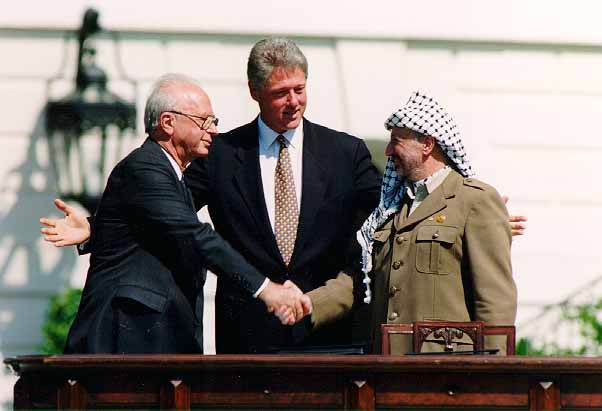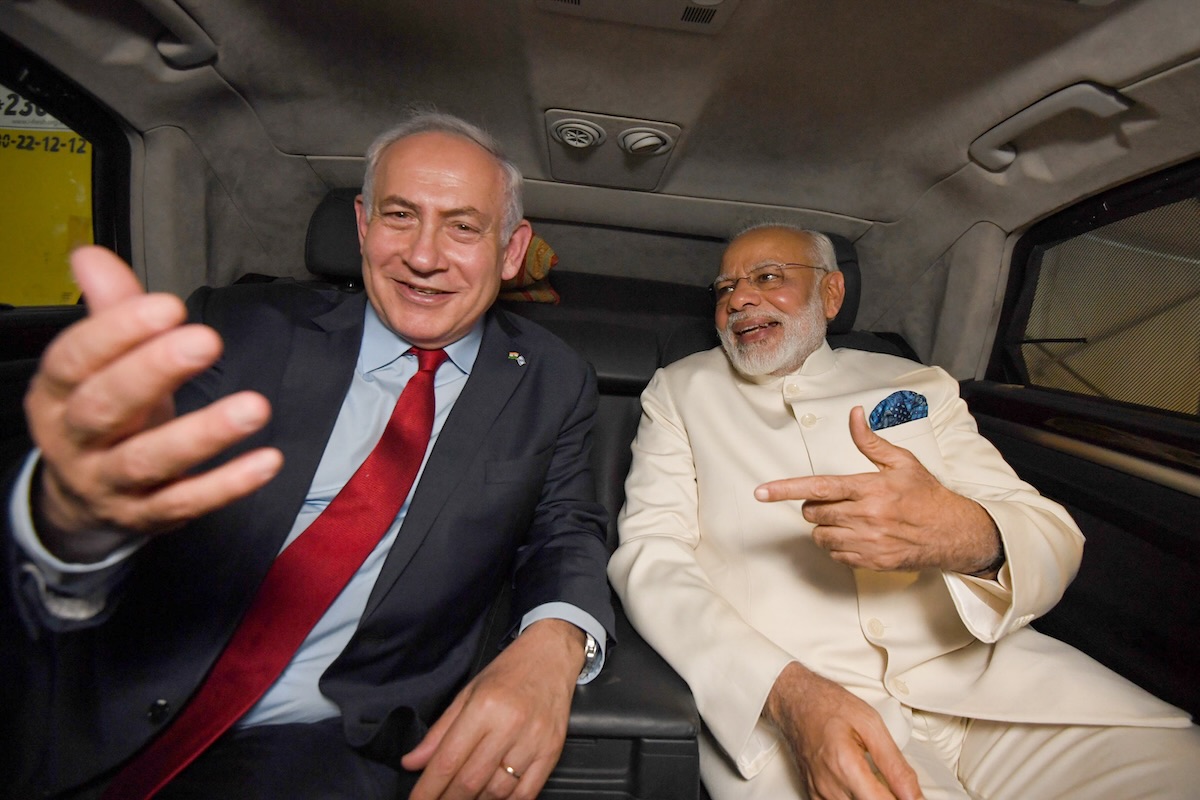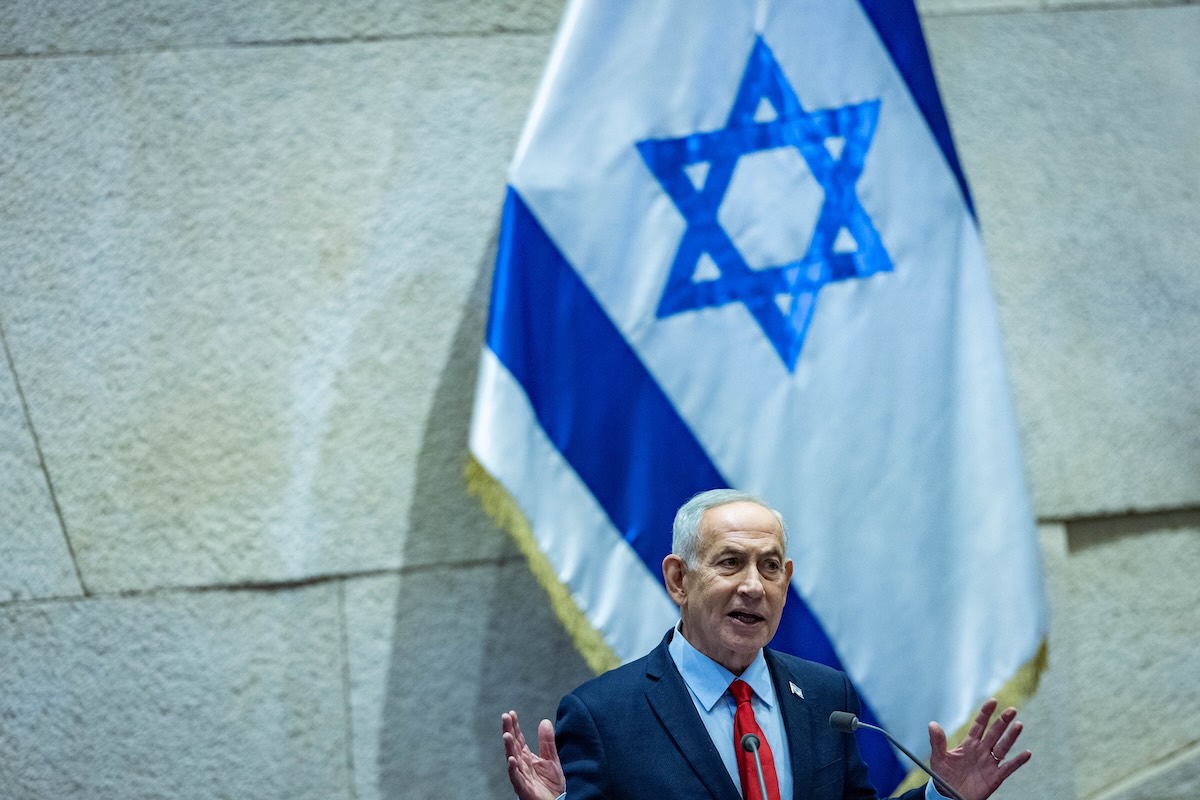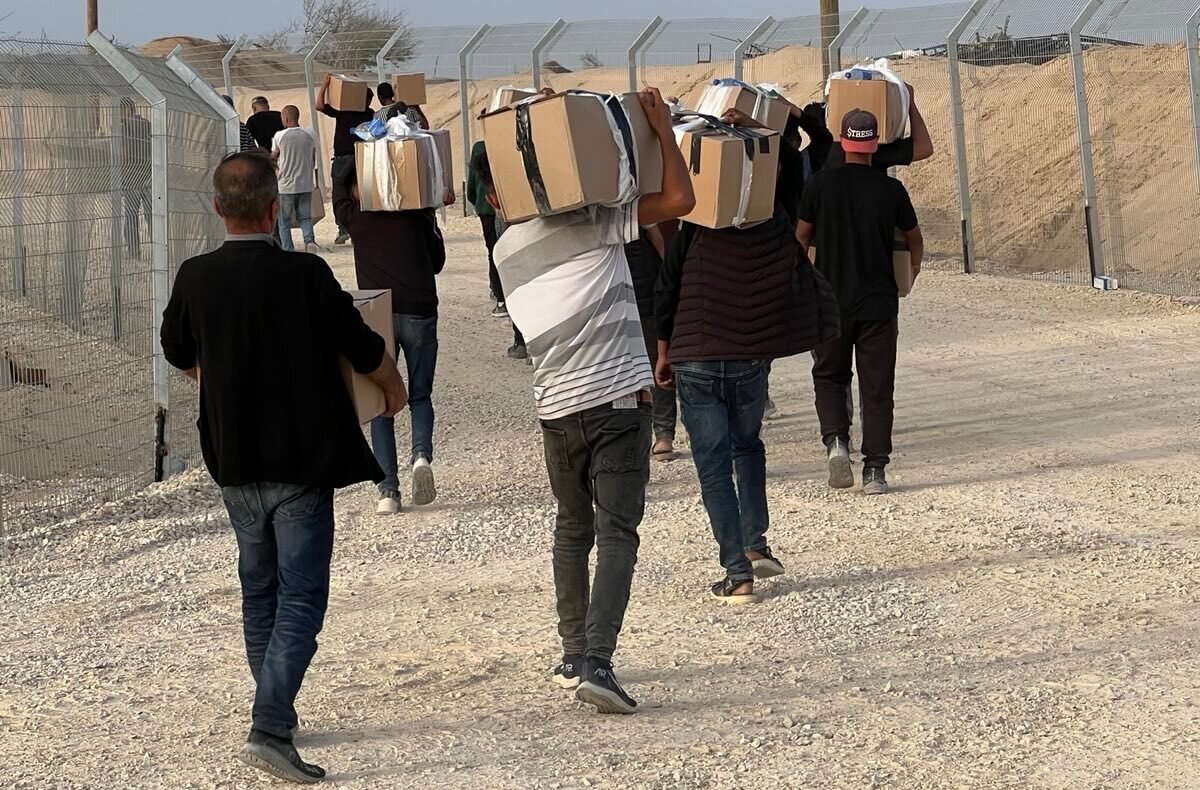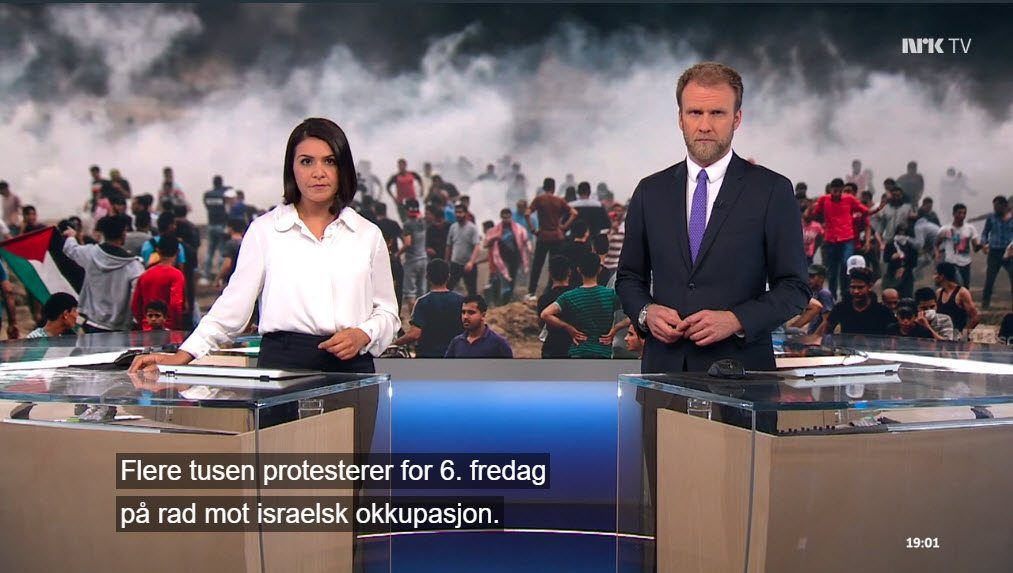Kort bakgrunn
Oslo-avtalen mellom PLO og Israel kom i stand med god hjelp fra den norske utenriksminister Johan Jørgen Holst og hans medarbeidere.
Utenriksminister Holst fikk den 9. september 1993 et brev fra PLOs formann, Yassir Arafat, som sier at PLO anerkjenner Israels rett til å leve i fred og sikkerhet. Organisasjonen forpliktet seg til å leve i fredelig sameksistens med Israel, oppgi bruken av terrorisme og forsikret at den vil forandre Det Palestinske Nasjonalcharter, slik at det kommer i samsvar med den nye situasjonen.
Et brev som var adressert til utenriksminister Holst, ble også presentert sammen med ovenstående brev. PLO oppfordret der det palestinske folk til å forkaste vold og terror og bidra til fred.
Da utenriksminister Holst presenterte disse brevene fra Arafat for statsminister Yitzhak Rabin, undertegnet statsministeren et brev som ble overlevert Holst. Dette brevet uttrykte at den israelske regjeringen hadde bestemt seg for å anerkjenne PLO som representant for det palestinske folk. Utvekslingen av disse brev banet veien for den historiske undertegnelsen i Washington den 13. september 1993 av Prinsipp-erklæringen mellom Israel og PLO, med president Bill Clinton som vertskap og i nærvær av bl.a. utenriksmininster Holst.
Kilde for engelsk oversettelse er Ariel Center for Policy Research.
MÅLET FOR FORHANDLINGENE
Målet for de israelsk-palestinske forhandlingene innenfor den nåværende fredsprosessen om Midtøsten er, blant annet, å etablere en palestinsk midlertidig selvstyrende myndighet, det valgte råd («Rådet»), for det palestinske folket på Vestbredden og i Gaza-stripen, i en overgangsperiode som ikke skal overskride fem år, og som skal føre til en permanent ordning basert på Sikkerhetsrådets resolusjoner 242 og 338.
RAMMEN FOR INTERIMS-PERIODEN
Den avtalte rammen for interims-perioden er lagt frem i denne Prinsipperklæringen.
VALG
1. For at det palestinske folket på Vestbredden og i Gaza-stripen skal kunne styre seg selv ifølge demokratiske prinsipper, skal direkte, frie og almindelige politiske valg til Rådet holdes under avtalt overvåking og internasjonal observasjon, mens det palestinske politiet sikrer offentlig orden.
JURISDIKSJON
Rådets jurisdiksjon skal dekke territoriene Vestbredden og Gaza-stripen med unntak av de spørsmål som vil bli diskutert i forhandlingene om permanent status. De to partene betrakter Vestbredden og Gaza-stripen som en enhetlig territorial enhet, hvis integritet skal opprettholdes i interims-perioden.
OVERGANGSPERIODE OG FORHANDLINGER OM PERMANENT STATUS
1. Den femårige overgangsperioden skal starte ved tilbaketrekkingen fra Gaza-stripen og Jeriko-området.
FORBEREDENDE OVERFØRING AV MAKT OG ANSVAR
1. Når denne Prinsipperklæringen og tilbaketrekkingen fra Gaza-stripen og Jeriko-området trer i kraft, skal overføringen av makt fra det israelske militærstyret og dets siviladministrasjon til palestinerne autorisert for denne oppgaven, som beskrevet i detalj her, begynne. Denne overføring av myndighet skal være av forberedende karakter inntil innsettelsen av Rådet.
INTERIMS-AVTALEN
1. De israelske og palestinske delegasjonene skal forhandle frem en avtale om interims-perioden («interims-avtalen»)
OFFENTLIG ORDEN OG SIKKERHET
For å garantere offentlig orden og intern sikkerhet for palestinerne på Vestbredden og i Gaza-stripen, skal Rådet opprette en sterk politistyrke, mens Israel vil fortsette å bære ansvaret for forsvaret mot ytre trusler, såvel som ansvaret for den generelle sikkerheten til israelerne, i den hensikt å trygge deres indre sikkerhet og offentlige orden.
LOVER OG MILITÆRE ORDRE
1. Rådet gis makt til å gi lover i henhold til interims-avtalen innenfor alle myndigheter som er gitt det.
FELLES ISRAELSK-PALESTINSK FORBINDELSESKOMITŠ
For å skape en ukomplisert gjennomføring av denne Prinsipperklæringen og alle senere avtaler som har å gjøre med interims-avtalen når denne Prinsipperklæringen trer i kraft, vil det bli oppretter en felles israelsk-palestinsk forbindelseskomitÈ for å håndtere spørsmål som krever koordinering, andre spørsmål av felles interesse og uoverensstemmelser.
ISRAELSK-PALESTINSK SAMARBEIDE PÅ ØKONOMISKE OMRÅDER
Idet man innser det felles gode i å samarbeide om å fremme utviklingen på Vestbredden i Gaza-Stripen og i Israel når Prinsipperklæringen trer i kraft, skal en israelsk-palestinsk økonomisk samarbeidskomitÈ opprettes for å samarbeidende om å utvikle og gjennomføre programmene kjennetegnet i protokollene vedlagt som Bilag III og Bilag IV.
FORBINDELSE OG SAMARBEIDE MED JORDAN OG EGYPT
De to partene skal invitere regjeringene i Jordan og Egypt til å delta i opprettelsen av ytterligere forbindelser og samarbeidsordninger mellom den israelske regjering og de palestinske representantene på den ene siden, og regjeringene i Jordan og Egypt på den andre siden, for å fremme samarbeidet mellom dem. Disse ordninger skal inkludere opprettelsen av en videreførende komité som gjennom enighet skal bestemme formalitetene med hensyn til adgangen for forviste personer fra Vestbredden og Gaza-stripen fra 1967, sammen med nødvendige skritt for å forhindre sammenbrudd og uorden. Andre fellesanliggender vil bli behandlet av denne komitéen.
OMPLASSERING AV ISRAELSKE STYRKER
1. Etterat denne Prinsipperklæringen trer i kraft, og ikke senere enn like før valgene til Rådet, skal en omplassering av israelske militære styrker på Vestbredden og Gaza-stripen finne sted, i tillegg til en tilbaketrekking av israelske styrker gjennomført i henhold til Artikkel XIV.
ISRAELSK TILBAKETREKKING FRA GAZA-STRIPEN OG JERIKO-OMRÅDET
Israel skal trekke seg tilbake fra Gaza-stripen og Jeriko-området, som detaljene i protokollen vedlagt som Bilag II, viser.
LØSNING AV UOVERENSKOMSTER
1. Uoverenskomster som oppstår ved gjennomføringen eller tolkingen av denne Prinsipperklæringen, eller noen senere avtaler i forbindelse med denne interims-perioden, skal løses ved forhandlinger gjennom den felles forbindelseskomitÈ som skal opprettes i samsvar med Artikkel X ovenfor.
ISRAELSK-PALESTINSK SAMARBEIDE I FORBINDELSE MED REGIONALE PROGRAM
Begge parter betrakter de multilaterale arbeidsgrupper som et hensiktsmessig instrument for å fremme en «Marshall-plan», de regionale program og andre program, inkludert spesielle program for Vestbredden og Gaza-stripen, som antydet i protokollen, vedlagt som Bilag IV.
DIVERSE BESTEMMELSER
1. Denne Prinipperklæringen skal tre i kraft en måned etter at den er undertegnet.
Her følger hele avtalen inkludert tilleggspunkter i engelsk tekst.
OSLO I AGREEMENT
September 13, 1993
Declaration of Principles on Interim Self-Government Arrangements
The Government of the State of Israel and the PLO team (in the Jordanian-Palestinian delegation to the Middle East Peace Conference) (the «Palestinian Delegation»), representing the Palestinian people, agree that it is time to put an end to decades of confrontation and conflict, recognize their mutual legitimate and political rights, and strive to live in peaceful coexistence and mutual dignity and security and achieve a just, lasting and comprehensive peace settlement and historic reconciliation through the agreed political process. Accordingly, the two sides agree to the following principles:
ARTICLE I
Aim of the Negotiations:
The aim of the Israeli-Palestinian negotiations within the current Middle East peace process is, among other things, to establish a Palestinian Interim Self-Government Authority, the elected Council (the «Council»), for the Palestinian people in the West Bank and the Gaza Strip, for a transitional period not exceeding five years, leading to a permanent settlement based on Security Council Resolutions 242 and 338.
It is understood that the interim arrangements are an integral part of the whole peace process and that the negotiations on the permanent status will lead to the implementation of Security Council Resolutions 242 and 338.
ARTICLE II
Framework for the Interim Period:
The agreed framework for the interim period is set forth in this Declaration of Principles.
ARTICLE III
Elections:
- In order that the Palestinian people in the West Bank and Gaza Strip may govern themselves according to democratic principles, direct, free and general political elections will be held for the Council under agreed supervision and international observation, while the Palestinian police will ensure public order.
- An agreement will be concluded on the exact mode and conditions of the elections in accordance with the protocol attached as Annex I, with the goal of holding the elections not later than nine months after the entry into force of this Declaration of Principles.
- These elections will constitute a significant interim preparatory step toward the realization of the legitimate rights of the Palestinian people and their just requirements.
Article IV
Jurisdiction:
Jurisdiction of the Council will cover West Bank and Gaza Strip territory, except for issues that will be negotiated in the permanent status negotiations. The two sides view the West Bank and the Gaza Strip as a single territorial unit, whose integrity will be preserved during the interim period.
Article V
Transitional Period and Permanent Status Negotiations:
- The five-year transitional period will begin upon the withdrawal from the Gaza Strip and Jericho area.
- Permanent status negotiations will commence as soon as possible, but not later than the beginning of the third year of the interim period, between the Government of Israel and the Palestinian people representatives.
- It is understood that these negotiations shall cover remaining issues, including: Jerusalem, refugees, settlements, security arrangements, borders, relations and cooperation with other neighbors, and other issues of common interest.
- The two parties agree that the outcome of the permanent status negotiations should not be prejudiced or preempted by agreements reached for the interim period.
Article VI
Preparatory Transfer of Powers and Responsibilities:
- Upon the entry into force of this Declaration of Principles and the withdrawal from the Gaza Strip and the Jericho area, a transfer of authority from the Israeli military government and its Civil Administration to the authorized Palestinians for this task, as detailed herein, will commence. This transfer of authority will be of a preparatory nature until the inauguration of the Council.
- Immediately after the entry into force of this Declaration of Principles and the withdrawal from the Gaza Strip and Jericho area, with the view to promoting economic development in the West Bank and Gaza Strip, authority will be transferred to the Palestinians on the following spheres: education and culture, health, social welfare, direct taxation, and tourism. The Palestinian side will commence in building the Palestinian police force, as agreed upon. Pending the inauguration of the Council, the two parties may negotiate the transfer of additional powers and responsibilities, as agreed upon.
Article VII
Interim Arrangement:
- The Israeli and Palestinian delegations will negotiate an agreement on the interim period (the «Interim Agreement»)
- The Interim Agreement shall specify, among other things, the structure of the Council, the number of its members, and the transfer of powers and responsibilities from the Israeli military government and its Civil Administration to the Council. The Interim Agreement shall also specify the Council’s executive authority, legislative authority in accordance with Article IX below, and the independent Palestinian judicial organs.
- The Interim Agreement shall include arrangements, to be implemented upon the inauguration of the Council, for the assumption by the Council of all of the powers and responsibilities transferred previously in accordance with Article VI above.
- In order to enable the Council to promote economic growth, upon its inauguration, the Council will establish, among other things, a Palestinian Electricity Authority, a Gaza Sea Port Authority, a Palestinian Development Bank, a Palestinian Export Promotion Board, a Palestinian Environmental Authority, a Palestinian Land Authority and a Palestinian Water Administration Authority, and any other Authorities agreed upon, in accordance with the Interim Agreement that will specify their powers and responsibilities.
- After the inauguration of the Council, the Civil Administration will be dissolved, and the Israeli military government will be withdrawn.
Article VIII
Public Order and Security
In order to guarantee public order and internal security for the Palestinians of the West Bank and the Gaza Strip, the Council will establish a strong police force, while Israel will continue to carry the responsibility for defending against external threats, as well as the responsibility for overall security of Israelis for the purpose of safeguarding their internal security and public order.
Article IX
Laws and Military Orders:
- The Council will be empowered to legislate, in accordance with the Interim Agreement, within all authorities transferred to it.
- Both parties will review jointly laws and military orders presently in force in remaining spheres.
Article X
Joint Israeli-Palestinian Liaison Committee:
In order to provide for a smooth implementation of this Declaration of Principles and any subsequent agreements pertaining to the interim period, upon the entry into force of this Declaration of Principles, a Joint Israeli-Palestinian Liaison Committee will be established in order to deal with issues requiring coordination, other issues of common interest, and disputes.
Article XI
Israeli-Palestinian Cooperation in Economic Fields:
Recognizing the mutual benefit of cooperation in promoting the development of the West Bank, the Gaza Strip and Israel, upon the entry into force of this Declaration of Principles, an Israeli-Palestinian Economic Cooperation Committee will be established in order to develop and implement in a cooperative manner the programs identified in the protocols attached as Annex III and Annex IV.
Article XII
Liaison and Cooperation with Jordan and Egypt:
The two parties will invite the Governments of Jordan and Egypt to participate in establishing further liaison and cooperation arrangements between the Government of Israel and the Palestinian representatives, on the one hand, and the Governments of Jordan and Egypt, on the other hand, to promote cooperation between them. These arrangements will include the constitution of a Continuing Committee that will decide by agreement on the modalities of admission of persons displaced from the West Bank and Gaza Strip in 1967, together with necessary measures to prevent disruption and disorder. Other matters of common concern will be dealt with by this Committee.
Article XIII
Redeployment of Israeli Forces:
- After the entry into force of this Declaration of Principles, and not later than the eve of elections for the Council, a redeployment of Israeli military forces in the West Bank and the Gaza Strip will take place, in addition to withdrawal of Israeli forces carried out in accordance with Article XIV.
- In redeploying its military forces, Israel will be guided by the principle that its military forces should be redeployed outside populated areas.
- Further redeployments to specified locations will be gradually implemented commensurate with the assumption of responsibility for public order and internal security by the Palestinian police force pursuant to Article VIII above.
Article XIV
Israeli Withdrawal from the Gaza Strip and Jericho Area:
Israel will withdraw from the Gaza Strip and Jericho area, as detailed in the protocol attached as Annex II.
Article XV
Resolution of Disputes:
- Disputes arising out of the application or interpretation of this Declaration of Principles. or any subsequent agreements pertaining to the interim period, shall be resolved by negotiations through the Joint Liaison Committee to be established pursuant to Article X above.
- Disputes which cannot be settled by negotiations may be resolved by a mechanism of conciliation to be agreed upon by the parties.
- The parties may agree to submit to arbitration disputes relating to the interim period, which cannot be settled through conciliation. To this end, upon the agreement of both parties, the parties will establish an Arbitration Committee.
Article XVI
Israeli-Palestinian Cooperation Concerning Regional Programs:
Both parties view the multilateral working groups as an appropriate instrument for promoting a «Marshall Plan», the regional programs and other programs, including special programs for the West Bank and Gaza Strip, as indicated in the protocol attached as Annex IV.
Article XVII
Miscellaneous Provisions:
- This Declaration of Principles will enter into force one month after its signing.
- All protocols annexed to this Declaration of Principles and Agreed Minutes pertaining thereto shall be regarded as an integral part hereof.
Done at Washington, DC, this thirteenth day of September 1993.
For the Government of Israel
For the PLO
Witnessed By:
The United States of America
The Russian FederationANNEX I
Protocol on the Mode and Conditions of Elections
- Palestinians of Jerusalem who live there will have the right to participate in the election process, according to an agreement between the two sides.
- In addition, the election agreement should cover, among other things, the following issues:
- the system of elections;
- the mode of the agreed supervision and international observation and their personal composition; and
- rules and regulations regarding election campaign, including agreed arrangements for the organizing of mass media, and the possibility of licensing a broadcasting and TV station.
- The future status of displaced Palestinians who were registered on 4th June 1967 will not be prejudiced because they are unable to participate in the election process due to practical reasons.
ANNEX II
Protocol on Withdrawal of Israeli Forces from the Gaza Strip and Jericho Area:
- The two sides will conclude and sign within two months from the date of entry into force of this Declaration of Principles, an agreement on the withdrawal of Israeli military forces from the Gaza Strip and Jericho area. This agreement will include comprehensive arrangements to apply in the Gaza Strip and the Jericho area subsequent to the Israeli withdrawal.
- Israel will implement an accelerated and scheduled withdrawal of Israeli military forces from the Gaza Strip and Jericho area, beginning immediately with the signing of the agreement on the Gaza Strip and Jericho area and to be completed within a period not exceeding four months after the signing of this agreement.
- The above agreement will include, among other things:
- Arrangements for a smooth and peaceful transfer of authority from the Israeli military government and its Civil Administration to the Palestinian representatives.
- Structure, powers and responsibilities of the Palestinian authority in these areas, except: external security, settlements, Israelis, foreign relations, and other mutually agreed matters.
- Arrangements for the assumption of internal security and public order by the Palestinian police force consisting of police officers recruited locally and from abroad holding Jordanian passports and Palestinian documents issued by Egypt). Those who will participate in the Palestinian police force coming from abroad should be trained as police and police officers.
- A temporary international or foreign presence, as agreed upon.
- Establishment of a joint Palestinian-Israeli Coordination and Cooperation Committee for mutual security purposes.
- An economic development and stabilization program, including the establishment of an Emergency Fund, to encourage foreign investment, and financial and economic support. Both sides will coordinate and cooperate jointly and unilaterally with regional and international parties to support these aims.
- Arrangements for a safe passage for persons and transportation between the Gaza Strip and Jericho area.
The above agreement will include arrangements for coordination between both parties regarding passages:
- Gaza – Egypt; and
- Jericho – Jordan.
The offices responsible for carrying out the powers and responsibilities of the Palestinian authority under this Annex II and Article VI of the Declaration of Principles will be located in the Gaza Strip and in the Jericho area pending the inauguration of the Council.
Other than these agreed arrangements, the status of the Gaza Strip and Jericho area will continue to be an integral part of the West Bank and Gaza Strip, and will not be changed in the interim period.
ANNEX III
Protocol on Israeli-Palestinian Cooperation in Economic and Development Programs
The two sides agree to establish an Israeli-Palestinian continuing Committee for Economic Cooperation, focusing, among other things, on the following:
- Cooperation in the field of water, including a Water Development Program prepared by experts from both sides, which will also specify the mode of cooperation in the management of water resources in the West Bank and Gaza Strip, and will include proposals for studies and plans on water rights of each party, as well as on the equitable utilization of joint water resources for implementation in and beyond the interim period.
- Cooperation in the field of electricity, including an Electricity Development Program, which will also specify the mode of cooperation for the production, maintenance, purchase and sale of electricity resources.
- Cooperation in the field of energy, including an Energy Development Program, which will provide for the exploitation of oil and gas for industrial purposes, particularly in the Gaza Strip and in the Negev, and will encourage further joint exploitation of other energy resources. This Program may also provide for the construction of a Petrochemical industrial complex in the Gaza Strip and the construction of oil and gas pipelines.
- Cooperation in the field of finance, including a Financial Development and Action Program for the encouragement of international investment in the West Bank and the Gaza Strip, and in Israel, as well as the establishment of a Palestinian Development Bank.
- Cooperation in the field of transport and communications, including a Program, which will define guidelines for the establishment of a Gaza Sea Port Area, and will provide for the establishing of transport and communications lines to and from the West Bank and the Gaza Strip to Israel and to other countries. In addition, this Program will provide for carrying out the necessary construction of roads, railways, communications lines, etc.
- Cooperation in the field of trade, including studies, and Trade Promotion Programs, which will encourage local, regional and inter-regional trade, as well as a feasibility study of creating free trade zones in the Gaza Strip and in Israel, mutual access to these zones, and cooperation in other areas related to trade and commerce.
- Cooperation in the field of industry, including Industrial Development Programs, which will provide for the establishment of joint Israeli-Palestinian Industrial Research and Development Centers, will promote Palestinian-Israeli joint ventures, and provide guidelines for cooperation in the textile, food, pharmaceutical, electronics, diamonds, computer and science-based industries.
- A program for cooperation in, and regulation of, labor relations and cooperation in social welfare issues.
- A Human Resources Development and Cooperation Plan, providing for joint Israeli-Palestinian workshops and seminars, and for the establishment of joint vocational training centers, research institutes and data banks.
- An Environmental Protection Plan, providing for joint and/or coordinated measures in this sphere.
- A program for developing coordination and cooperation in the field of communication and media.
- Any other programs of mutual interest.
ANNEX IV
Protocol on Israeli-Palestinian Cooperation concerning Regional Development Programs
- The two sides will cooperate in the context of the multilateral peace efforts in promoting a Development Program for the region, including the West Bank and the Gaza Strip, to be initiated by the G-7. The parties will request the G-7 to seek the participation in this program of other interested states, such as members of the Organization for Economic Cooperation and Development, regional Arab states and institutions, as well as members of the private sector.
- The Development Program will consist of two elements:
- an Economic Development Program for the ‘West Bank and the Gaza Strip.
- a Regional Economic Development Program.
- The Economic Development Program for the West Bank and the Gaza strip will consist of the following elements:
- A Social Rehabilitation Program, including a Housing and Construction Program.
- A Small and Medium Business Development Plan.
- An Infrastructure Development Program (water, electricity, transportation and communications, etc.)
- A Human Resources Plan.
- Other programs.
- The Regional Economic Development Program may consist of the following elements:
- The establishment of a Middle East Development Fund, as a first step, and a Middle East Development Bank, as a second step.
- The development of a joint Israeli-Palestinian-Jordanian Plan for coordinated exploitation of the Dead Sea area.
- The Mediterranean Sea (Gaza) – Dead Sea Canal.
- Regional Desalinization and other water development projects.
- A regional plan for agricultural development, including a coordinated regional effort for the prevention of desertification.
- Interconnection of electricity grids.
- Regional cooperation for the transfer, distribution and industrial exploitation of gas, oil and other energy resources.
- A Regional Tourism, Transportation and Telecommunications Development Plan.
- Regional cooperation in other spheres.
- The two sides will encourage the multilateral working groups, and will coordinate towards their success. The two parties will encourage intersessional activities, as well as pre-feasibility and feasibility studies, within the various multilateral working groups.
Agreed Minutes to the Declaration of Principles on Interim Self-Government Arrangements
General Understanding and Agreements:
Any powers and responsibilities transferred to the Palestinians pursuant to the Declaration of Principles prior to the inauguration of the Council will be subject to the same principles pertaining to Article IV, as set out in these Agreed Minutes below.
Article IV
Specific Understandings and Agreements:
It is understood that:
- Jurisdiction of the Council will cover West Bank and Gaza Strip territory, except for issues that will be negotiated in the permanent status negotiations: Jerusalem, settlements, military locations, and Israelis.
- The Council’s jurisdiction will apply with regard to the agreed powers, responsibilities, spheres and authorities transferred to it.
Article VI (2)
It is agreed that the transfer of authority will be as follows:
- The Palestinian side will inform the Israeli side of the names of the authorized Palestinians who will assume the powers, authorities and responsibilities that will be transferred to the Palestinians according to the Declaration of Principles in the following fields: education and culture, health, social welfare, direct taxation, tourism, and any other authorities agreed upon.
- It is understood that the rights and obligations of these offices will not be affected.
- Each of the spheres described above will continue to enjoy existing budgetary allocations in accordance with arrangements to be mutually agreed upon.These arrangements also will provide for the necessary adjustments required in order to take into account the taxes collected by the direct taxation office.
- Upon the execution of the Declaration of Principles, the Israeli and Palestinian delegations will immediately commence negotiations on a detailed plan for the transfer of authority on the above offices in accordance with the above understandings.
Article VII (2)
The Interim Agreement will also include arrangements for coordination and cooperation.
Article VII (5)
The withdrawal of the military government will not prevent Israel from exercising the powers and responsibilities not transferred to the Council.
Article VIII
It is understood that the Interim Agreement will include arrangements for cooperation and coordination between the two parties in this regard. It is also agreed that the transfer of powers and responsibilities to the Palestinian police will be accomplished in a phased manner, as agreed in the Interim Agreement.
Article X
It is agreed that, upon the entry into force of the Declaration of Principles, the Israeli and Palestinian delegations will exchange the names of the individuals designated by them as members of the Joint Israeli-Palestinian Liaison Committee.
It is further agreed that each side will have an equal number of members in the Joint Committee. The Joint Committee will reach decisions by agreement. The Joint Committee may add other technicians and experts, as necessary. The Joint Committee will decide on the frequency and place or places of its meetings.
Annex II
It is understood that, subsequent to the Israeli withdrawal, Israel will continue to be responsible for external security, and for internal security and public order of settlements and Israelis. Israeli military forces and civilians may continue to use roads freely within the Gaza Strip and the Jericho area.
Done at Washington, DC, this thirteenth day of September 1993.
For the Government of Israel
For the PLO
Witnessed By:
The United States of America
The Russian Federation
